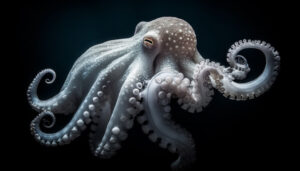Did You Know? Octopuses Have Three Hearts & Blue Blood! 🐙💙
The ocean is full of incredible and mysterious creatures, but few are as fascinating as the octopus. These intelligent, shape-shifting masters of disguise are already mind-blowing, but here’s something even crazier—they have three hearts and blue blood! 🤯🌊
Yes, you read that right! Octopuses are unlike any other creature in many ways, and their circulatory system is one of their most unique features. Let’s dive into the science behind their three hearts and blue blood and find out why nature designed them this way!
Why Do Octopuses Have Three Hearts? ❤️❤️❤️
Most animals, including humans, get by just fine with one heart. So why does an octopus need three? The answer lies in how their body functions underwater.
🔹 Two branchial hearts – These pump blood to the gills, where oxygen is absorbed from the water.
🔹 One systemic heart – This pumps oxygen-rich blood to the rest of the body.
Essentially, the two smaller hearts focus on getting oxygen into the blood, while the main heart ensures that oxygen gets delivered to the octopus’s muscles and organs. This helps octopuses stay efficient in their deep-sea environment, where oxygen levels can be lower than on land.
But here’s a surprising fact—when an octopus swims, its main heart actually stops beating! 🛑💔 Instead of relying on constant heart function, they prefer crawling along the ocean floor, which is less energy-intensive. This is why octopuses tend to be slow and stealthy rather than fast swimmers! 🏊♂️🐙
Why Is an Octopus’s Blood Blue? 🩵
Unlike humans, whose blood is red because of iron-based hemoglobin, octopuses have blue blood because their blood contains hemocyanin, a copper-based molecule that carries oxygen.
🔹 Iron (in humans) = Red blood ❤️
🔹 Copper (in octopuses) = Blue blood 💙
But why copper? 🤔 The ocean can be a cold and low-oxygen environment, and hemocyanin is more effective than hemoglobin at transporting oxygen in these conditions. This means that even in deep, icy waters, octopuses can breathe efficiently and thrive! 🌊❄️
More Mind-Blowing Octopus Facts! 🤯
Now that you know about their three hearts and blue blood, here are a few more amazing things about octopuses:
🐙 They are escape artists! Octopuses can squeeze through tiny openings as small as their beak—the only hard part of their body! 😲
🐙 They can change color instantly! Using special skin cells called chromatophores, they can blend into their surroundings in seconds. 🎨
🐙 They are highly intelligent! Octopuses can solve puzzles, open jars, and even recognize human faces. 🧠
🐙 They have short lifespans. Despite their intelligence, most octopuses live only 1 to 2 years! 😢
Final Thought: Octopuses Are Nature’s Marvels! 🌊
With three hearts, blue blood, and incredible intelligence, octopuses prove that nature is full of surprises! The next time you see an octopus at an aquarium or in the wild, take a moment to appreciate how truly unique and extraordinary these creatures are.
Did this fact blow your mind? 🤯 Share it with your friends and drop a 🐙 in the comments if you love octopuses! 💬👇
#DidYouKnow #OctopusFacts #MarineLife #BlueBlood #NatureIsAmazing #WildlifeWonders #FunFact





Leave a Reply
You must be logged in to post a comment.